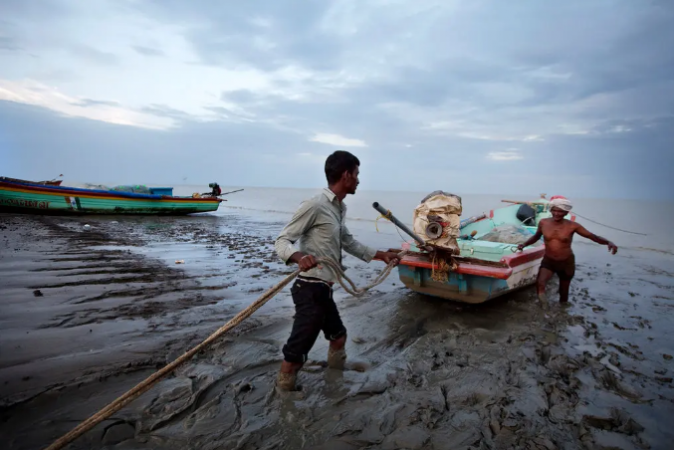
BEIJING: In the war-torn northern province of Sri Lanka, Velupillai Rasaratnam and a young fisherman pushed Velupillai's 15-foot-long wooden boat close to shore.
The 70-year-old, dressed in a black T-shirt and red shorts, queues up for nearly an hour while catching some gray mullets, which he sells at a nearby fish auction for 700 Sri Lankan rupees ($2). intends to sell. ,
His painful arms can only carry him for an hour. And as Sri Lanka grapples with a serious economic crisis, it is becoming more and more clear that fishermen like Rasratnam have suffered greatly due to severe fuel shortages.
The price of kerosene has quadrupled to Rs 340 ($0.93) per liter, making it impossible for me to use my motorized boat at sea. It was therefore impossible to travel very far, according to Rasratnam, who said that he now goes fishing only twice a week.
He went out every day, caught about 5 kilos of fish, and brought in about 5,000 rupees ($13.89) for his family of five before the country went bankrupt.
However, kerosene was already in short supply before the August price hike, forcing many fishermen to buy it on the black market for Rs 1,500 (US$4.17).
Fuel cost and availability are not the only troubling issues that fishermen must deal with. More Indian boats have been entering Sri Lanka's territorial waters for illegal fishing in the past 20 years.
Rasratnam remarked, “While we are confined to our homes due to the lack of kerosene, Indian fishermen are stealing all our resources.”
illegal fishing
In the Palk Strait, a narrow stretch of water separating the two nations, fishermen from Tamil Nadu in southern India and the northern province of Sri Lanka are legally allowed to fish.
Three months ago, a fisherman from Mannar district in the Northern Province pleaded with the Tamil Nadu chief minister to stop Indian fishermen from stealing fish from their smaller neighbour's waters, especially at a time when Sri Lanka is going through a financial crisis.
But no one answered that call. At least 16 Indians were detained last month by the Sri Lankan Navy for illegal fishing, following their incursion into the island nation's territorial waters.
According to Kandasamy Rajachandran, president of Ambal Fishermen's Co-operative Society in Karainagar, Sri Lankan fishermen are returning with just one basket of fish, weighing only one or two kilograms, for the last ten years, up from six to eight in the last ten years. is less. Arrival of Indian Trawlers.
Many different species of marine life, such as needlefish, emperor fish and prawns, are often carried by foreign trawlers.
According to Rajchandran, three stingrays weighing around 26 kg were the biggest catch that day. But now Indian trawlers are carrying stingrays much bigger than what we used to get.
They claimed that in 2002, when fishing was banned in the north due to a civil war between armed Tamil separatists and the Sri Lankan army, trawlers were the first to enter Sri Lankan waters.
His way of life was also affected by the devastating tsunami that hit the Indian Ocean in 2004, he continued.
Another fisherman, 40-year-old Thankarasa Prakash, believes his government has not addressed the issues brought up by Indian trawlers because most of the Sri Lankans whose livelihoods are affected are Tamils, an ethnic group in the Sinhalese-majority nation. are minorities.
Douglas Devananda, a politician from the Tamil community overseeing fisheries in Sri Lanka, claimed that despite repeated attempts to limit Indian fishing, those efforts were unsuccessful.
Another lifeline?
A Chinese company has now stepped in to fill the void after the stage was set.
In a joint venture between Gui Lan Hatchery and Sri Lanka's National Aquatic Development Authority, more than 1,000 fishermen in three northern districts—Mannar, Kilinochchi and Jaffna—are now growing sea cucumbers, a marine animal often considered a delicacy in Chinese cuisine.
Four mainland Chinese and two Taiwanese directors lead the business, which was established in 2015.
According to Devananda, he also urged fishermen to look into "alternative sources of livelihood", such as growing seaweed and sea bass.
China-India tension
The sea cucumber initiative is being criticized at a time when China, one of Sri Lanka's biggest creditors, has at least US$3.5 billion in unpaid debt, which has been partially funded for the country's current debt crisis. being held responsible.
Due to their shared Tamil ethnicity, the north of India and Sri Lanka have historically been viewed as being close to each other. However, as the two superpowers compete to gain a strategic advantage over the island nation, China is also expanding its influence in the region. Chinese ambassador to Sri Lanka Qi Zhenhong provided rations to fishermen harmed by Indian trawlers last year. At the height of the economic crisis in May of this year, India sent 15,000 litres of kerosene to the fishermen in northern Sri Lanka.
Vivekanandan Niranjan, an economist based in Jaffna, claimed that due to the lack of political and economic stability, Sri Lanka was allowing the India-China "geopolitical game" to take place on its soil.
Niranjan added that until things return to normal, Beijing and New Delhi will use the island nation to settle their differences.
But if the two are taking advantage of the island's present instability and using its territory as a battleground, Sri Lankans will be concerned, he added.
Gotabaya Rajapaksa to return to Sri Lanka on Saturday
Asia Cup 2022: SL vs BAN - Match Preview, Who will get to do the Naagin Dance?